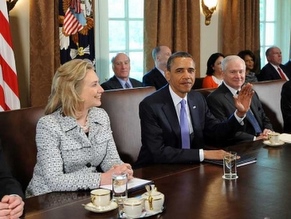|
World Jewish News

U.S. President Barack Obama releases information on the assault on bin Laden's compound at White House on May 3, 2011. Photo by: AFP
|
U.S.: Bin Laden was not armed during assault on compound
03.05.2011, Israel and the World Al-Qaida leader Osama bin Laden was not armed when U.S. special forces stormed his compound in Pakistan but he did resist before he was shot, White House spokesman Jay Carney said on Tuesday.
Carney said also that the White House is evaluating the possibility of releasing photos of the al-Qaida leader's body. He said there are concerns that publication of the photos could be inflammatory in the Middle East and other parts of the world.
"It could be inflammatory, we take this into account", Carney said about the pictures, which he described as "gruesome."
The White House spokesman described the operation on bin Laden's compound in detail.
"The assault force landed in 2 helicopters, cleared the compound room by room. In addition to Osama, 2 other family members resided in the compound. One woman was killed in a crossfire," Carney said. "Bin Laden and his family were found on the 2-3 floor. The assault force was concerned he would resist and he indeed resisted. His wife rushed to the assaulter and was wounded."
Carney declined to offer further details on bin Laden's behavior during the raid. Resistance did not require a firearm, he said.
U.S. forces faced a firefight throughout the 40-minute raid. "We expected a great deal of resistance and were met with a great deal of resistance. There were many other people who were armed in the compound," Carney said.
A day after U.S. commandos killed the world's most wanted man after a 10-year manhunt, new details emerged from Pakistan's powerful intelligence agency and neighbors of bin Laden that raised more questions about whether some elements within Pakistan's security forces knew, and perhaps protected, the al-Qaida chief.
Neighbors in the city of Abbottabad, a two-hour drive from the Pakistani capital, sensed something was odd about the house where bin Laden and members of his family lived, even though the terror chief and his family rarely ventured outside and most residents were not aware that foreigners were living there.
One man, Sher Mohammed Khan, said his sister went to the house to administer a polio vaccination as part of a government-backed drive. When she remarked on all the expensive SUVs inside the compound, a man immediately asked her to leave, but not before taking the vaccine to apparently administer to the children inside.
People were skeptical in this neighborhood about this place and these guys, said Mashood Khan, a 45-year-old farmer. They used to gossip, say they were smugglers or drug dealers. People would complain that even with such a big house they didn't invite the poor or distribute charity.
U.S. officials have suggested Pakistani officials may have known where bin Laden was living. Members of Congress have seized on those suspicions to call for the U.S. to consider cutting billions of aid to Pakistan if it turns out the government knew where bin Laden was hiding.
However, within Pakistan, the domestic criticism has been more focused on the U.S. breaching the country's sovereignty. The U.S. has said it did not inform the Pakistanis ahead of time about the raid, for fear they would tip off the targets.
A strongly worded Pakistani government statement warned the U.S. not to launch similar operations in the future. It rejected suggestions that officials knew where bin Laden was.
Still there were other revelations that pointed to prior knowledge that the compound was linked to al-Qaida.
Pakistani intelligence agencies hunting for a top al-Qaida operative staged a 2003 raid against the house where bin Laden was killed, said a senior officer, speaking on condition of anonymity in line with the spy agency's policy.
U.S. officials have said bin Laden lived in the house for up to six years, begging the question of how he could have moved into the property without the Pakistani government knowing. The three-story house is located in a middle-class neighborhood of Abbottabad and is surrounded by 15-foot walls.
The house was just being built when Pakistan's Inter-Services Intelligence agency raided it in 2003 in a search of Abu Faraj al-Libi, regarded as al-Qaida's No. 3, said the agency officer. Al-Libi was not there, he said.
Since the operation against bin Laden, a U.S. official has said that al-Libi once lived in the house and that information from him played a role in tracking the al-Qaida chief down.
The Pakistani officer said he didn't know why al-Qaida would use a house that already had been compromised.
Al-Libi was arrested by Pakistani police in 2005 after a shootout in the northwestern town of Mardan. He was later handed over to U.S. authorities.
The officer said the ISI would have captured bin Laden if it had known where he was there, and pushed back at international criticism of the agency.
"Look at our track record given the issues we have faced, the lack of funds. We have killed or captured hundreds (of extremists)," said the officer. "All of a sudden one failure makes us incompetent and 10 years of effort is overlooked."
By Natasha Mozgovaya and News Agencies
Haaretz.com
|
|
